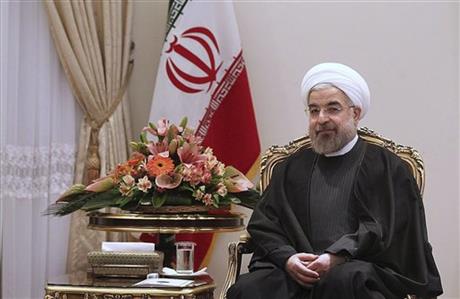
By NASSER KARIMI
In this photo released by the official website of the office of the Iranian Presidency, President Hassan Rouhani sits in a meeting with Swedish Foreign Minister Carl Bildt at the Presidency compound in Tehran, Iran, Tuesday, Feb. 4, 2014. Iran’s official IRNA news agency quoted President Hassan Rouhani as saying his country is ready for final nuclear talks with world powers. The Tuesday remarks came during a meeting with visiting Swedish Minister for Foreign Affairs Carl Bildt. (AP Photo/Presidency Office, Mohammad Berno)
TEHRAN, Iran (AP) — In a rare expression of regret by an Iranian official, President Hassan Rouhani has said that he is sorry for any troubles with the distribution of a food ration to the poor, following reports that three people have died waiting for the goods in subzero weather.
Local media have reported that the three died in recent days while standing in line in freezing temperatures. Authorities were quoted as saying that they had pre-existing heart problems.
Most provinces in Iran have experienced unusually low temperatures in recent days.
Rouhani told state TV late Wednesday that he “as the president expresses regret if people have faced trouble in receiving the commodity basket.”
It’s unusual for an official in Iran to take responsibility for problems in a governmental plan.
The ration for the poor includes eggs, cooking oil, chicken, rice and cheese. The program was instituted under Rouhani’s predecessor, Mahmoud Ahmadinejad, originally just for government workers.
Rouhani’s administration decided to extend it from 3 million people to 17 million, out of a total population of 76 million. The plan is largely intended to counteract inflation, fed by the sanctions imposed on Iran over its nuclear program.
Abolhasan Firoozabadi, the deputy labor minister who handles the plan, told the official IRNA news agency that more than 11 million baskets of goods have been distributed so far.
But the lines to receive the goods are very long. “I returned home empty-handed after waiting three hours in the line. They said they did not have enough stuff for today,” said Zahr Sadri, a mother of three.
Ramin Pakzad, a part-time worker, said he tried and failed to find a line short enough that he wouldn’t risk losing his job by standing in it.
Rouhani’s opponents have leaped on the failures of the plan, with the hard-line Javan daily declaring it a “national humiliation.”
But even many of his supporters also acknowledge its shortcomings. “I think this is an uncalculated idea that government applied hastily and without any precautions,” said Sadegh Zibakalam, a Tehran University politics professor who supported Rouhani in June presidential elections.
One Tehran-based analyst, Saeed Leilaz, said he believed that Rouhani’s plan failed to successfully sort out those poor enough to qualify. Officials routinely complain that Iran lacks much basic demographic data.
However, Leilaz said, Rouhani did manage to lower inflation considerably since he took office in August, “the sharpest drop in Iran’s inflation history.”
Rouhani’s remarks came during a longer interview, the run-up to which revealed apparent tensions between his aides and the country’s top broadcast company, which is mainly under the influence of hard-liners.
With the interview running late from its scheduled time, a Tweet from an account associated with Rouhani — the content of which the president has said is mostly written by “friends” — said the head of the national broadcasting company Ezzatollah Zarghami “prevented live discussion (with the) people.”
The semi-official Fars news agency said Thursday that Zarghami had sent a letter to the supervisory board of the company asking them to decide about “selecting reporters” for high-level interviews.
This suggests that the presidential office had sought a particular reporter for the live interview, and that Zarghami had opposed the request.
State TV on Wednesday cited technical problems for the delay.
Supreme Leader Ayatollah Ali Khamenei, who has final say on all state matters, chooses the head of the broadcasting company but it works under a supervisory board that contains representatives from all branches of power.
Khamenei has so far backed Rouhani and most of his policies.
Calls to officials were not immediately returned on Thursday due to the weekend in Tehran.


